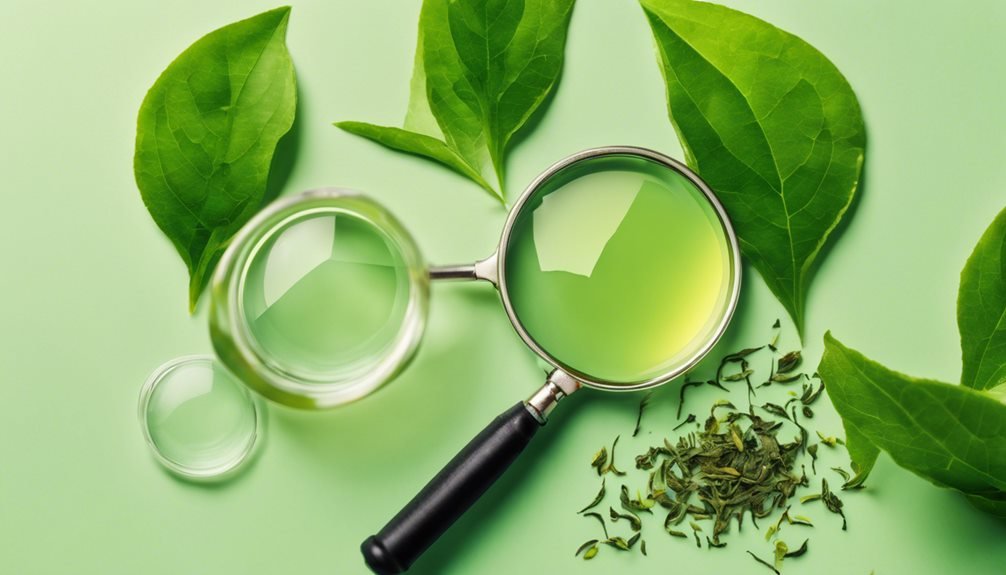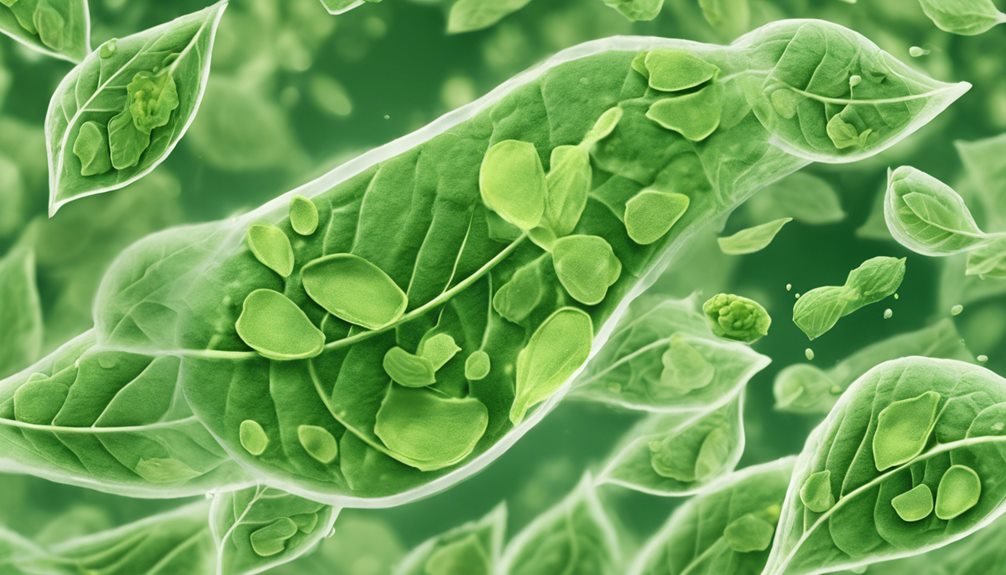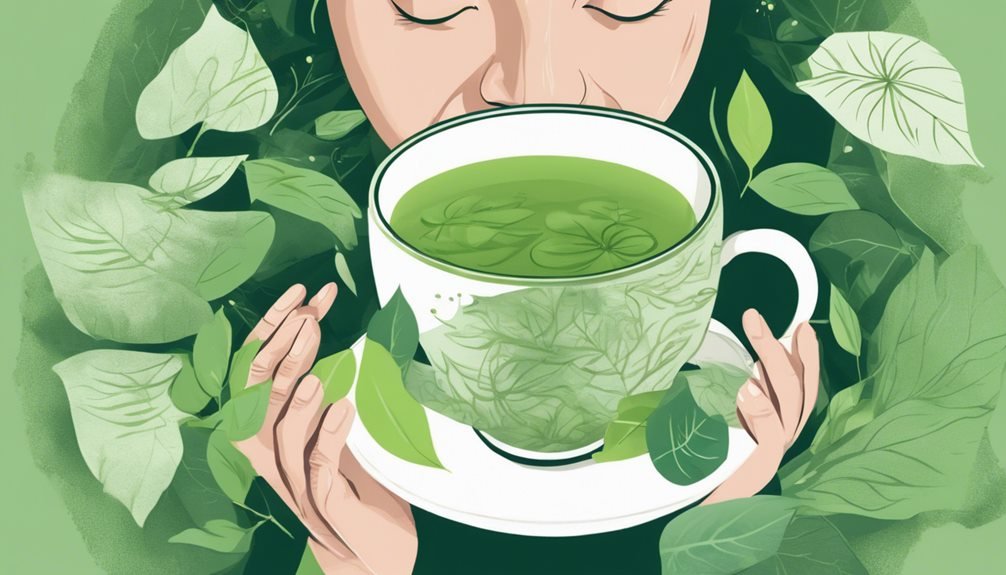You've heard about green tea's potential in fighting cancer, but do you know why it's so effective? The intricate mechanisms behind green tea's anti-cancer properties are fascinating yet crucial for understanding its impact on cancer cells. From its polyphenol content to the specific catechin EGCG, green tea demonstrates promising results in inhibiting tumors and supporting cellular health. But how exactly does green tea achieve these remarkable feats, and what makes it a standout choice in the realm of cancer prevention and treatment?
Key Takeaways
- Green tea's polyphenols, like EGCG, inhibit tumor growth and induce cancer cell apoptosis.
- Antioxidants in green tea, particularly EGCG, neutralize free radicals and protect cells from damage.
- Regular green tea consumption reduces breast, prostate, and colorectal cancer risks.
- EGCG interferes with cancer cell processes, inhibiting proliferation and angiogenesis.
- Green tea's bioactive compounds protect cells, promote repair, and support cancer prevention.
Green Tea: A Cancer-Fighting Brew
Green tea has long been recognized for its potential as a cancer-fighting brew due to its high concentration of polyphenols, particularly catechins. These compounds have shown promising effects in cancer prevention and treatment. The benefits of green tea in cancer prevention are attributed to its ability to inhibit tumor growth, reduce inflammation, and induce apoptosis in cancer cells.
Catechins, specifically epigallocatechin gallate (EGCG), are the most abundant and potent polyphenols in green tea. EGCG has been extensively studied for its anti-cancer properties. It can interfere with multiple signaling pathways involved in cancer development, making it a promising natural compound for cancer prevention.
Regular consumption of green tea, rich in catechins, is associated with a reduced risk of various types of cancer, including breast, prostate, and colorectal cancer. The antioxidant and anti-inflammatory properties of green tea further contribute to its cancer-fighting abilities. Incorporating green tea into your daily routine may be a simple yet effective way to support your overall health and well-being.
Antioxidants in Green Tea
Within green tea, an array of potent antioxidants play a crucial role in its health-promoting properties. Antioxidants are compounds that help neutralize harmful free radicals in the body, which are byproducts of normal bodily processes and can lead to oxidative stress. Oxidative stress is linked to various diseases, including cancer. Green tea contains high levels of antioxidants such as catechins, particularly epigallocatechin gallate (EGCG), which have been shown to have cancer-fighting properties by protecting cells from damage and inhibiting tumor growth.
These antioxidants work by scavenging free radicals and reducing oxidative stress, which is essential for cancer prevention. EGCG, in particular, has been extensively studied for its potential anti-cancer effects. It can interfere with various cellular processes involved in cancer development, such as cell proliferation and angiogenesis.
Polyphenols and Cancer Prevention

Polyphenols are a diverse group of plant-based compounds known for their beneficial effects on human health. When it comes to cancer prevention, polyphenols found in green tea have shown promising benefits. These compounds have antioxidant properties that help protect cells from damage caused by free radicals, which are harmful molecules that can lead to cancer development.
Polyphenols also have anti-inflammatory effects, which may further contribute to their cancer-preventive properties.
In addition to their cancer-fighting abilities, polyphenols in green tea have been associated with other health benefits such as improving heart health, enhancing brain function, and aiding in weight management. However, it's important to note that while polyphenols offer numerous health benefits, consuming large amounts of green tea may lead to certain side effects such as insomnia, digestive issues, or interactions with certain medications.
Therefore, it's recommended to consume green tea in moderation to harness its potential benefits while minimizing any possible negative side effects.
Green Tea and Cell Damage
A key aspect to consider when discussing the effects of green tea on cell health is the impact of its bioactive compounds on cell damage. Green tea contains antioxidants such as catechins, which play a crucial role in protecting cells from oxidative stress.
Oxidative stress occurs when there's an imbalance between free radicals and antioxidants in the body, leading to cell damage and potential harm.
The bioactive compounds in green tea help combat oxidative stress by neutralizing free radicals and reducing the damage they can cause to cells. By doing so, green tea promotes cell repair processes and supports overall cell health.
This is particularly important in the context of cancer prevention, as damaged cells can sometimes develop into cancerous cells if not repaired efficiently.
Regular consumption of green tea can provide your body with the necessary tools to combat oxidative stress and protect your cells from damage. By incorporating green tea into your daily routine, you're actively supporting your body's natural mechanisms for cell repair and maintenance.
Epigallocatechin Gallate (EGCG)

Exploring the role of Epigallocatechin Gallate (EGCG) in green tea unveils its potent bioactive properties that contribute significantly to its health benefits. EGCG, a catechin found abundantly in green tea, is known for its powerful antioxidant effects. These antioxidants help combat free radicals in the body, reducing oxidative stress and inflammation.
Additionally, EGCG has been studied extensively for its potential anti-cancer properties. Research suggests that EGCG benefits may include inhibiting the growth of cancer cells and promoting their self-destruction.
For those looking to maximize their EGCG intake, supplements are available as a convenient option. EGCG supplements offer a concentrated form of this beneficial compound, allowing individuals to easily incorporate it into their daily routine.
When choosing EGCG supplements, it's important to opt for high-quality products from reputable sources to ensure potency and purity. By adding EGCG supplements to your regimen, you can harness the potential health benefits of this powerful compound found in green tea.
Green Tea and Tumor Growth
Studies have shown that green tea may have a significant impact on tumor growth. Green tea contains compounds like epigallocatechin gallate (EGCG) that play a role in tumor suppression by inhibiting angiogenesis, the process of forming new blood vessels that tumors need to grow. Additionally, green tea has been found to induce apoptosis, which is the programmed cell death of cancer cells, and regulate the cell cycle, preventing uncontrolled cell growth that contributes to tumor development.
The angiogenesis inhibition properties of green tea prevent tumors from accessing the nutrients and oxygen they need to grow and spread throughout the body. By promoting apoptosis in cancer cells, green tea helps eliminate these abnormal cells, slowing down tumor growth.
Furthermore, the ability of green tea to regulate the cell cycle ensures that cancer cells don't proliferate uncontrollably.
Mechanisms of Cancer Inhibition

Green tea's ability to inhibit cancer involves intricate mechanisms that target various aspects of tumor development and progression. One key mechanism is its impact on the cell cycle. Green tea compounds have been shown to regulate the cell cycle by controlling the progression of cells through different phases, thereby preventing uncontrolled cell growth characteristic of cancer. This regulation helps maintain the balance between cell division and cell death, crucial for the prevention of tumor formation.
Another critical mechanism through which green tea inhibits cancer is apoptosis induction. Apoptosis, or programmed cell death, is essential in eliminating damaged or abnormal cells to prevent tumor growth. Green tea components have been found to promote apoptosis in cancer cells, leading to their self-destruction. This process is vital for removing potentially harmful cells before they can multiply and form tumors.
Clinical Studies on Green Tea
Research in clinical settings has delved into the effects of green tea consumption on cancer prevention and treatment. Green tea clinical trials have provided valuable insights into the potential benefits of this popular beverage in combating cancer.
Some key findings include:
- Improved Cancer Biomarkers: Studies have shown that green tea consumption can lead to favorable changes in cancer-related biomarkers, indicating a potential protective effect against certain types of cancer.
- Enhanced Treatment Efficacy: Green tea clinical trials have revealed that incorporating green tea extracts into cancer treatment regimens may enhance the efficacy of conventional therapies, potentially improving patient outcomes.
- Meta Analysis Support: A meta-analysis of various green tea clinical trials has provided a comprehensive overview of the cumulative evidence regarding the impact of green tea on cancer prevention and treatment. This analysis helps researchers and healthcare professionals better understand the overall trends and implications of using green tea in cancer care.
Green Tea and Breast Cancer

When considering the relationship between green tea consumption and breast cancer, it becomes evident that numerous investigations have explored the potential impact of this beverage on the prevention and treatment of this particular type of cancer. Green tea has shown promising effects in breast cancer prevention due to its high concentration of antioxidants, specifically catechins. These compounds have been found to inhibit the growth of cancer cells, reduce inflammation, and even induce cancer cell death in laboratory studies. The benefits of green tea extend to potentially reducing the risk of developing breast cancer, especially in combination with a healthy lifestyle.
Studies have suggested that regular consumption of green tea may help lower the risk of breast cancer by interfering with the mechanisms that promote tumor growth and spread.
The polyphenols present in green tea play a crucial role in regulating cellular processes that are involved in cancer development. While more research is needed to draw definitive conclusions, incorporating green tea into your daily routine may be a beneficial step in supporting breast cancer prevention efforts.
Green Tea and Prostate Cancer
In studies investigating the relationship between tea consumption and prostate cancer, researchers have uncovered intriguing findings regarding the potential impact of this popular beverage on the development and progression of this particular cancer type. Green tea has shown promising effects on prostate health and cancer prevention. Here are key points to consider:
- Polyphenols: Green tea is rich in polyphenols, particularly catechins like epigallocatechin gallate (EGCG), which have been linked to reduced prostate cancer risk.
- Anti-inflammatory Properties: The anti-inflammatory properties of green tea may help in combating inflammation in the prostate, potentially reducing the risk of cancer development.
- Antioxidant Effects: The antioxidants present in green tea can help neutralize harmful free radicals in the body, which play a role in cancer initiation and progression, thus contributing to cancer prevention efforts.
Considering these factors, incorporating green tea into your daily routine may offer benefits for prostate health and contribute to lowering the risk of prostate cancer.
Green Tea as Complementary Therapy

The potential of green tea as a complementary therapy in cancer treatment lies in its bioactive compounds and their ability to interact with cellular pathways involved in tumor growth and progression. When considering treatment options, incorporating green tea into your daily routine can provide additional support in fighting cancer.
Green tea's dietary benefits include being rich in antioxidants, particularly catechins like epigallocatechin gallate (EGCG), which have shown promising anti-cancer effects in studies. These compounds help regulate cell signaling pathways, inhibit angiogenesis (the formation of new blood vessels that feed tumors), and induce cell death in cancer cells.
Incorporating Green Tea Into Your Diet
With its abundance of bioactive compounds, green tea presents a promising addition to your diet for potential cancer-fighting benefits. Incorporating green tea into your daily routine can be delightful and beneficial. Here are some creative ways to enjoy the goodness of green tea:
- Green Tea Smoothies: Blend green tea with fruits like pineapple, spinach, and banana for a refreshing and nutritious smoothie. The antioxidants in green tea combined with the vitamins from fruits make for a powerful cancer-fighting drink.
- Green Tea Matcha Recipes: Explore the world of matcha with recipes like matcha lattes, matcha pancakes, or matcha energy balls. Matcha, a finely ground green tea powder, is packed with even more antioxidants than regular green tea, amplifying its potential health benefits.
- Green Tea Infused Dishes: Experiment with incorporating green tea into your cooking. Try adding brewed green tea as a marinade for tofu, using it in salad dressings, or infusing it into rice dishes for a unique flavor profile with added health perks.
Frequently Asked Questions
Can Green Tea Prevent All Types of Cancer?
Green tea doesn't prevent all types of cancer. Specific cancers have shown varying responses to green tea in mechanism studies. While it may offer some protection against certain types of cancer due to its antioxidant properties and ability to inhibit tumor growth, it isn't a universal preventive measure.
It's essential to consult with healthcare professionals for a comprehensive approach to cancer prevention and treatment.
Are There Any Side Effects of Consuming Green Tea?
When consuming green tea, it's essential to be aware of potential side effects. Some individuals may experience allergies or reactions to the components in green tea.
Caffeine content in green tea should also be considered, as excessive intake can lead to adverse effects.
Moderation is key to reaping the benefits of green tea while minimizing any potential side effects. Be mindful of your body's response and consult with a healthcare provider if needed.
Does the Quality of Green Tea Affect Its Anti-Cancer Properties?
When it comes to the anti-cancer properties of green tea, the quality of sourcing plays a significant role. The way green tea is cultivated, harvested, and processed can impact its effectiveness.
Additionally, the caffeine content in green tea can also influence its anti-cancer properties. Opting for high-quality green tea sourced from reputable sources and being mindful of the caffeine levels can enhance the potential benefits in combating cancer.
How Does Green Tea Compare to Other Cancer-Fighting Foods?
When comparing green tea to other cancer-fighting foods like berries and turmeric, green tea stands out for its rich content of polyphenols, specifically catechins like EGCG. These compounds have been shown to exhibit potent antioxidant and anti-inflammatory properties, which may help in preventing cancer development.
Berries also contain antioxidants, while turmeric contains curcumin, known for its anti-inflammatory effects. Green tea's unique catechins make it a valuable addition to a cancer-fighting diet.
Is There a Recommended Daily Intake of Green Tea for Cancer Prevention?
Curious about the ideal green tea dose for cancer prevention? For optimal consumption, experts recommend 3-5 cups daily.
This dosage provides a sufficient amount of polyphenols, the key compounds in green tea linked to anticancer properties.
Remember, moderation is key as excessive intake may lead to side effects.
Conclusion
In conclusion, green tea serves as a powerful ally in the fight against cancer, acting as a shield to protect your cells from harm. Like a vigilant guardian, the polyphenols and antioxidants in green tea work tirelessly to combat cancerous cells and prevent their growth. By incorporating this cancer-fighting brew into your daily routine, you are equipping your body with a potent weapon against the threat of cancer. So sip on some green tea and let its protective powers work their magic.





